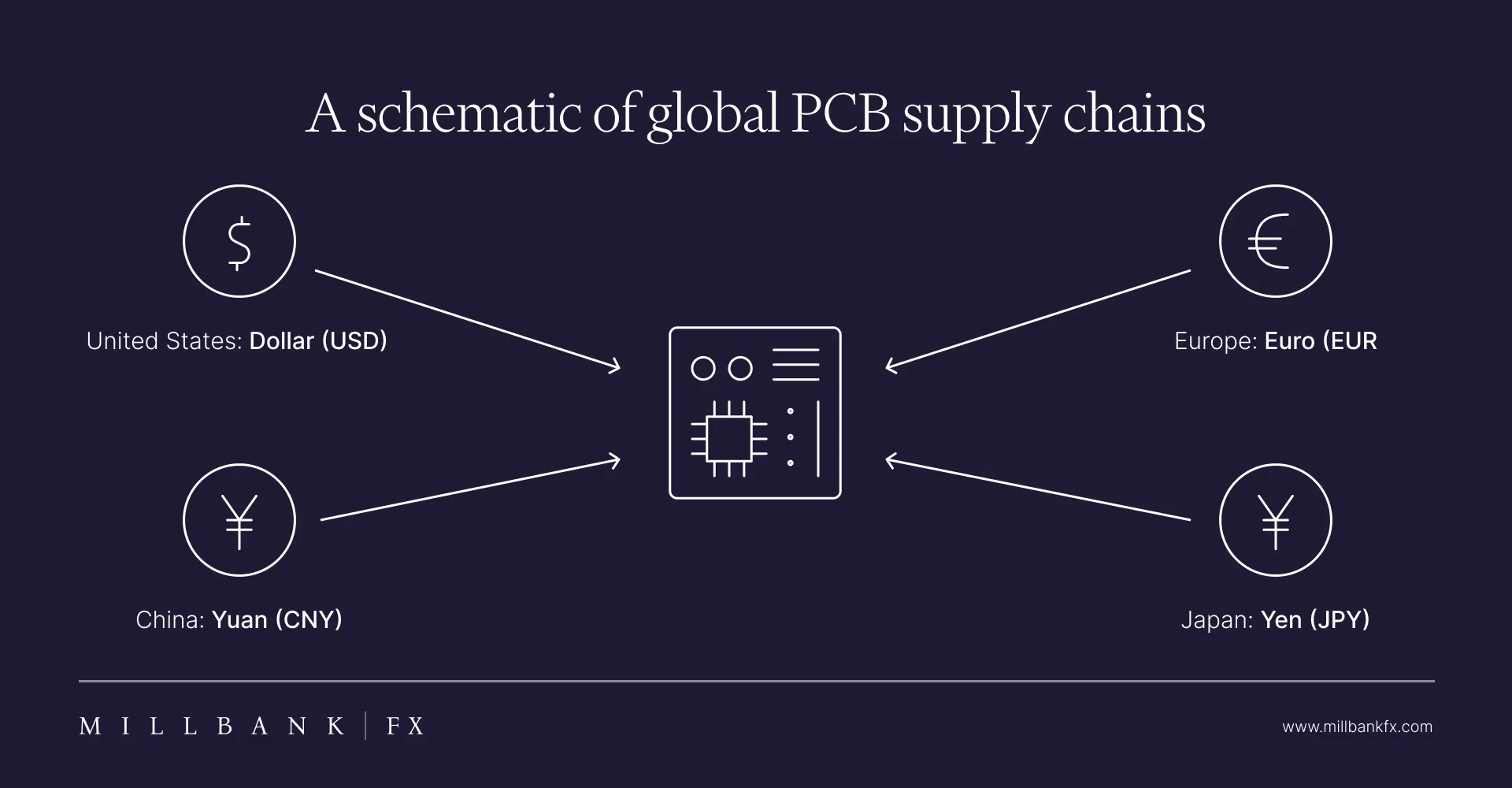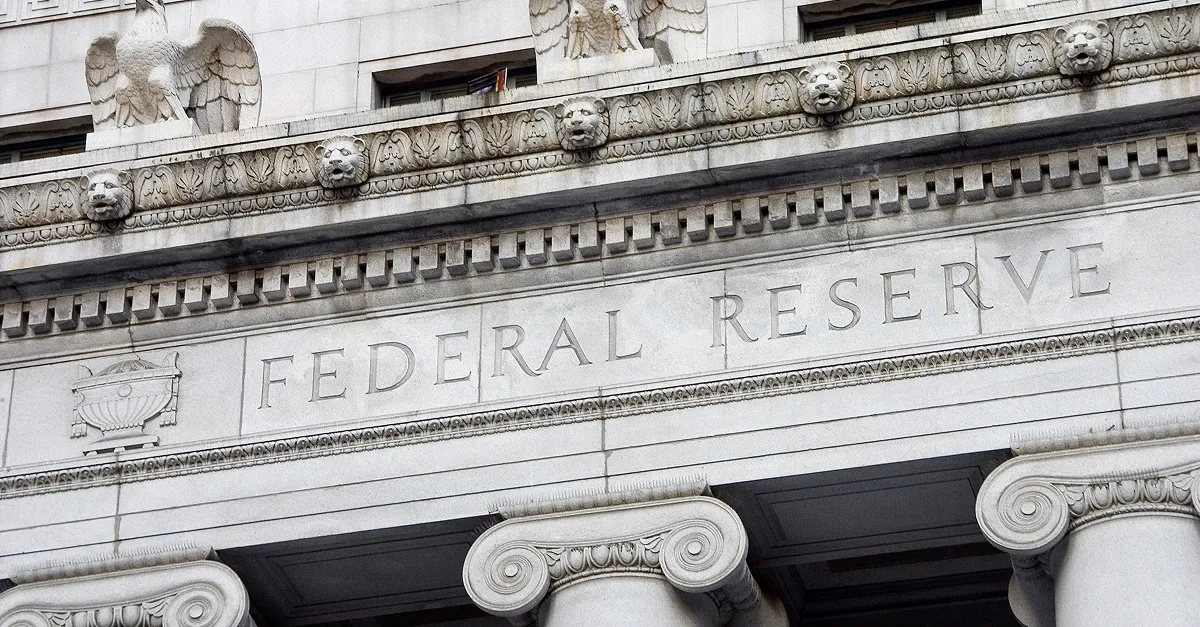Leiterplatten (PCBs) sind das Rückgrat der meisten Elektronikprodukte, von Unterhaltungsgeräten bis hin zu komplexen Industrieanlagen. Für britische Elektronikhersteller und Importeure bedeutete die Sicherung der Leiterplatten-Lieferketten schon immer, Lieferfristen, Qualität und Kosteneffizienz in Einklang zu bringen. Eine wichtige Kostenvariable — Währungsschwankungen — stellt jedoch nach wie vor eine große Herausforderung dar, da die meisten Leiterplattenlieferanten ihre Rechnungen in US-Dollar (USD) oder chinesischen Yuan (CNY) abrechnen.
In diesem Leitfaden wird erklärt, wie Terminkontrakte funktionieren, welchen besonderen Wert sie für Elektronikunternehmen haben, die Leiterplatten importieren, und wie Sie sie einsetzen können, um die Margenerosion aufgrund von Wechselkursschwankungen (FX) zu reduzieren. Wir beantworten auch häufig gestellte Fragen und klären Risikofaktoren auf.
Warum reagieren die PCB-Importkosten so empfindlich auf Schwankungen zwischen GBP/USD und GBP/CNY?
Niedrige Margen sind ein Markenzeichen der Elektronikbranche, in der sich die Materialkosten mit jedem Cent der Wechselkursbewegung schnell ändern können. Eine negative Entwicklung von 2% bei einer jährlichen PCB-Importrechnung von 1 Million Pfund entspricht einem Margenverlust von 20.000 GBP — ein erheblicher Effekt für Finanzverantwortliche, gemessen an der Kostenkontrolle und der Optimierung der Bruttomarge. Das Wechselkursrisiko wird verstärkt durch:
- Lange Herstellungs- und Versandzyklen: Zahlungen erfolgen in der Regel Wochen oder Monate nach der ersten Bestellung.
- Großbestellung und Spot-Einkauf: Eine einzige große Leiterplattenbestellung kann Ihr Unternehmen Wechselkursschwankungen in sechsstelliger Höhe aussetzen.
- Fracht- und Logistikverzögerungen: Weitere Zeitlücken führen zu Unsicherheiten in Bezug auf den bei der Lieferung geschuldeten GBP-Wert.
Termingeschäfte sind ein etabliertes Instrument für britische Elektronikunternehmen, um prognostizierte Ausgaben zu schützen und Budgets mit größerer Zuversicht zu planen, unabhängig von den Devisenschlagzeilen.

So funktionieren PCB-Forward-Kontrakte
Ein Terminkontrakt ist eine private Vereinbarung mit Ihrem Devisenanbieter, um einen vereinbarten Wechselkurs für ein bestimmtes Währungsvolumen und einen zukünftigen Liefertermin (oder ein zukünftiges Lieferfenster) zu sichern. Dies gibt Elektronikunternehmen die Gewissheit, dass die GBP-Kosten für Leiterplattenimporte den Prognosen entsprechen werden, auch wenn sich die Kassakurse vor der Abrechnung deutlich ändern. Je nach interner Risikobereitschaft und Flexibilitätsanforderungen können Sie den Vertragsbetrag so festlegen, dass er Ihrer gesamten Bestellung entspricht oder einen bestimmten Anteil abdeckt.
Beispiel: Wenn Sie Leiterplatten im Wert von 500.000$ für die Lieferung im dritten Quartal benötigen, vereinbaren Sie heute einen Terminkontrakt, in dem angegeben ist, wie viel GBP am Zahlungstag erforderlich ist. Wenn das GBP in den nächsten zwei Monaten gegenüber dem USD an Wert verliert, erhöhen sich Ihre effektiven Kosten nicht, da Sie sich den Kurs im Voraus gesichert haben. Diese Gewissheit ist besonders wertvoll, wenn Sie Ausschreibungen für neue Aufträge abgeben, Angebote für Kunden erstellen oder knappe Projektbudgets verwalten müssen.
Arten von Terminkontrakten, die für PCB-Importe relevant sind
- Feste Vorwärtsbewegungen: Legen Sie ein genaues Abrechnungsdatum für eine bekannte Rechnung oder Lieferung fest.
- Fenster nach vorne: Lassen Sie sich jederzeit innerhalb einer Reihe von Terminen zurückziehen. Dies ist geeignet, wenn die Lieferung verzögert werden kann oder wenn Teillieferungen häufig sind.
- Nicht lieferbare Forwards: Wird seltener für Elektronik verwendet, kann aber für bestimmte Leiterplattenanbieter in Schwellenländern relevant sein.
Viele Leiter der Elektronikbranche entscheiden sich dafür, 80— 90% ihrer voraussichtlichen Ausgaben für Leiterplatten durch Forwards abzudecken, sodass sie sich eine gewisse Flexibilität für kurzfristige Projektänderungen oder Cashflow-Anforderungen bewahren. Ihre Strategie sollte Ihrer Sichtbarkeit der Bestellungen und dem vom Vorstand festgelegten Risikoprofil entsprechen.
Kommerzielle Vorteile für Elektronikunternehmen
- Margenschutz: Verhindern Sie, dass überraschende Kostenerhöhungen die ohnehin knappen Gewinne schmälern.
- Budgetsicherheit: Unterstützen Sie genauere Projektpreise, interne Budgetierung und Lieferkettenplanung.
- Beziehungen zu Lieferanten: Optimierte Zahlungsvereinbarungen können die Zuverlässigkeit und das Vertrauen von Offshore-Leiterplattenherstellern und Logistikpartnern verbessern.
PCB FX-Volatilität: Szenarien aus der realen Welt
Die jüngste Geschichte zeigt, warum das Devisenmanagement für Elektronikimporte von entscheidender Bedeutung ist:
- Im Jahr 2022 schwankten die GBP/USD-Zinssätze aufgrund politischer Störungen und Störungen in der Lieferkette im Laufe des Jahres um fast 10%. Käufer von Komponenten zu Dollarpreisen im Vereinigten Königreich verzeichneten erhebliche Kostenschwankungen.
- Die Währungsvolatilität erreicht oft gerade dann ihren Höhepunkt, wenn globale Frachtstaus zu Lieferverzögerungen führen, wodurch sich das Zeitfenster zwischen Bestellung, Versand und Restzahlung verlängert.
Bei einer Leiterplattenbestellung im Wert von 500.000 GBP, die in 90 Tagen fällig ist, entspricht eine unerwartete Abschwächung des GBP um 4% einer Überschreitung von 20.000 GBP gegenüber dem ursprünglichen Angebot. Bei einem Termingeschäft schützt der bei der Bestellung vereinbarte Wechselkurs Ihre Marge unabhängig von Kursschwankungen.

Mögliche Risiken: Was Finanzteams wissen sollten
Termingeschäfte bieten zwar wichtige Vorteile, Elektronikunternehmen müssen jedoch auch ihre Risiken berücksichtigen:
- Wenn Ihr Währungsbedarf sinkt (z. B. wenn eine Bestellung storniert oder reduziert wird), können Kosten für die Vertragslaufzeit anfallen oder Sie müssen sich mit dem vollen vereinbarten Betrag zufrieden geben.
- Wenn das GBP an Wert gewinnt, profitieren Sie nicht von dem verbesserten Marktzins und müssen den ursprünglichen Terminkurs zahlen.
- Einige Anbieter verlangen möglicherweise Sicherheiten (Marge), wenn die Zinssätze stark von Ihrer Vertragsposition abweichen. Dies ist eine praktische Überlegung für Treasury-Teams.
Diese Faktoren bedeuten, dass Speditionen sorgfältig dimensioniert und terminiert werden sollten — in der Regel nach bestätigten PCB-Bestellungen oder Lieferplänen, wobei Eventualitäten aus Gründen der Flexibilität nicht berücksichtigt werden sollten.
Alternativen zu Forwards: Sind Optionen oder Swaps für Elektronik-KMU nützlich?
Optionen und Swaps erhöhen zwar die Flexibilität, sind jedoch mit zusätzlicher Komplexität und zusätzlichen Kosten verbunden. Währungsoptionen ermöglichen das Recht (nicht die Verpflichtung), zu einem bestimmten Kurs umzutauschen, wodurch das Abwärtspotenzial begrenzt werden kann, jedoch ein Aufschlag erforderlich ist — was bei Geschäften mit geringen Margen im Elektronikbereich weniger attraktiv ist. Devisenswaps eignen sich zwar für größere Unternehmen mit gegenläufigen Zahlungsströmen oder ausgeklügelten Treasury-Operationen, werden aber nicht oft für den typischen PCB-Importbedarf britischer KMU genutzt.
Wenn Sie fortgeschrittenere Tools in Betracht ziehen, wenden Sie sich für die Szenarioplanung an einen Devisenberater. Für die meisten britischen Elektronikimporteure stellen Forwards die einfachste und kostengünstigste Möglichkeit dar, das PCB-FX-Risiko zu managen.
Integration von Forwards in Ihren Elektronikbeschaffungsprozess
Um den Nutzen von Termingeschäften zu maximieren:
- Stimmen Sie sich mit den Einkaufs- und Produktionsteams ab, um neben bestätigten Bestellungen auch den Zeitplan für die Devisendeckung festzulegen.
- Überprüfen Sie die prognostizierten Importmengen regelmäßig und passen Sie die Deckung an, wenn die Sichtbarkeit zunimmt.
- Dokumentieren Sie Ihre Devisenpolitik, um Prüfprotokolle zu führen und eine konsistente Entscheidungsfindung zu gewährleisten.
- Arbeiten Sie mit einem spezialisierten Anbieter zusammen, der sich mit der Elektronikbranche auskennt und Erfahrung in der Unterstützung von PCB-Importeuren mit hohem Volumen hat.
Onboarding bei Millbank FX: Was Sie erwartet
Elektronikunternehmen können das Onboarding in der Regel innerhalb weniger Stunden abschließen und ihren ersten Terminvertrag abschließen. Der Prozess ist auf Klarheit und die Einhaltung gesetzlicher Vorschriften ausgelegt und erfordert standardisierte KYC-Dokumente und einen Überblick über Ihre Importanforderungen. Nach der Einrichtung erhalten Sie eine fortlaufende Kontoverwaltung und regelmäßige Updates zum Devisenmarkt, sodass Sie trotz Volatilität Ihre Margen stabil halten können.
Häufig gestellte Fragen
Was ist ein Terminkontrakt und wie hilft er Elektronikunternehmen beim Import von Leiterplatten? Mit einem Termingeschäft können Sie sich einen Wechselkurs für zukünftige Zahlungen sichern. So können Sie Kosten vorhersagen und Ihre Margen vor Wechselkursschwankungen schützen. Ist die Verwendung von Terminkontrakten für PCB-Käufe mit Risiken verbunden? Ja Wenn sich die Wechselkurse vor der Abrechnung gegen Ihre Position bewegen, verlangt Ihr Anbieter möglicherweise Sicherheiten. Eine vorzeitige Auflösung von Verträgen kann mit Kosten verbunden sein. Wann ist der beste Zeitpunkt, um einen Terminkontrakt für Elektronikimporte zu nutzen? Wenn Sie mit erheblichen Währungsschwankungen rechnen oder einen festen Zahlungstermin für große Leiterplattenbestellungen im Ausland im Voraus planen. Können Termingeschäfte Teillieferungen oder nur den vollen Betrag abdecken? Sie können Termingeschäfte für jeden Teil Ihrer geplanten Ausgaben für Leiterplatten abschließen. In der Regel decken Sie 80 bis 90% ab, um Sicherheit und Flexibilität in Einklang zu bringen. Wie schnell kann ein britischer Elektronikimporteur einen Terminkontrakt mit Millbank FX abschließen? Unser Onboarding-Prozess ist unkompliziert. Elektronikunternehmen können ihren ersten Terminkontrakt in der Regel innerhalb weniger Stunden abschließen.
Zusammenfassung: Wichtige Erkenntnisse für Finanzteams im Elektronikbereich
- Termingeschäfte ermöglichen Margensicherheit und Budgetkontrolle beim Import von PCB in Fremdwährungen.
- Die Risiken müssen durch sorgfältige Dimensionierung, Vertragszeitgestaltung und Anbieterauswahl ausgeglichen werden.
- Ein schnelles Onboarding mit einem spezialisierten Anbieter wie Millbank FX stellt sicher, dass sich Ihre Devisenstrategie mit dem Wachstum Ihres Unternehmens und Ihrer Lieferketten weiterentwickelt.




